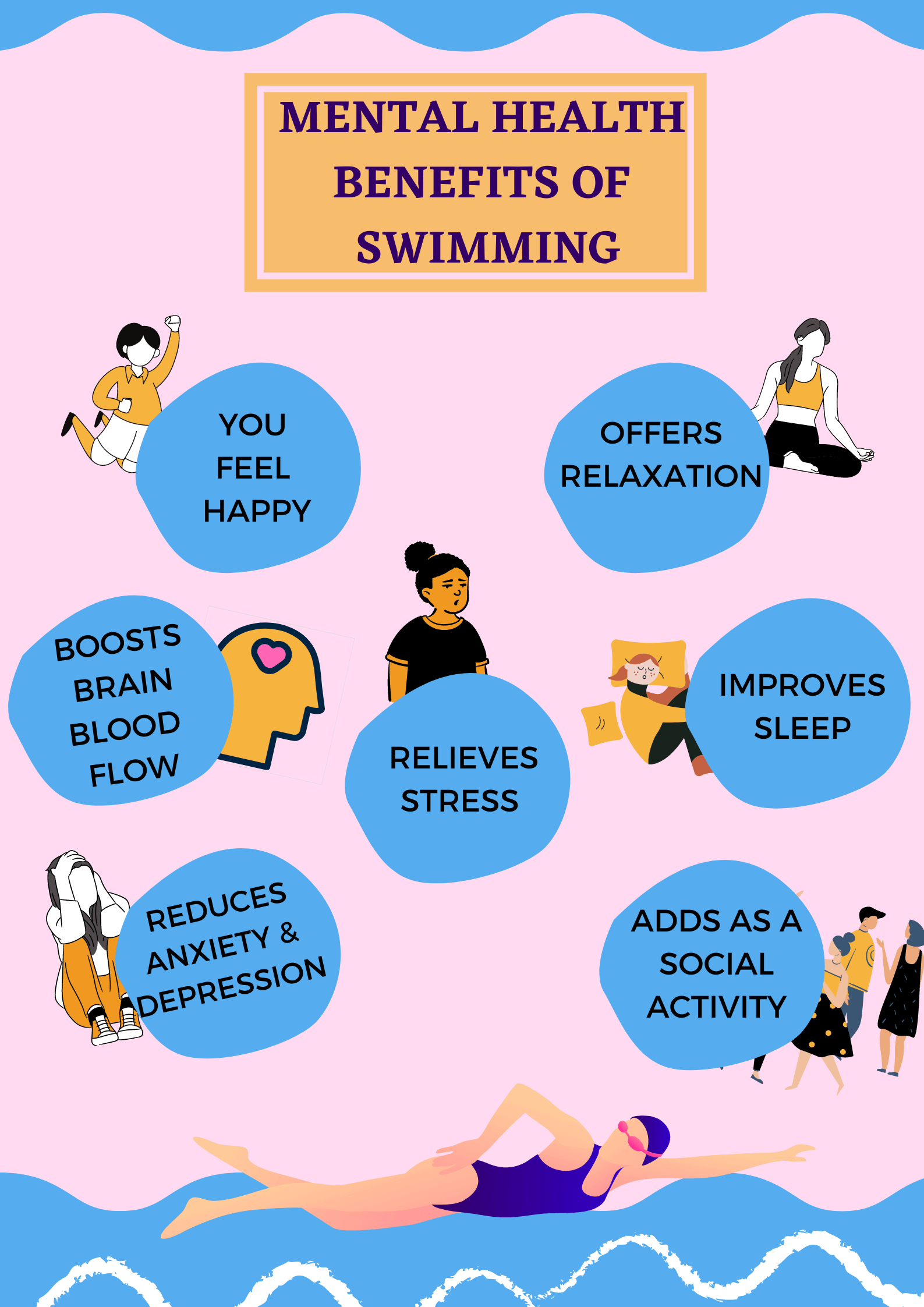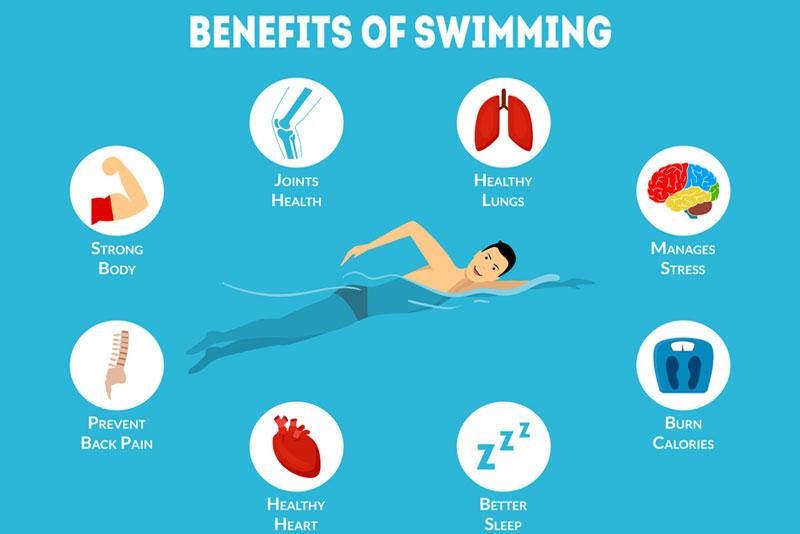The Surprising Mental Health Benefits of Swimming You Never Knew About

When we talk of visualization for mental health we often ask a person to visualize seaside, beach, or water flowing. Reason being that looking at water makes us feel calm, peaceful, and relaxed. Imagine when a mere vision of water can be so therapeutic for our mental wellness imagine what submerging ourselves into the water can do! Yes, I am talking about one of my favorite summer activities- SWIMMING!
In fact, recently I was exploring different activities that are found to boost the mood, increase wellness, and regain calm, the one activity that kept on showing on the list was swimming! This surely proves that swimming is a great activity to make a part of your life. But what is the magic behind swimming? Let us find it out!
Surprising Mental Health Benefits of Swimming
1. Swimming Makes You FEEL HAPPY
The first mental health benefit of swimming is that it reduces the level of stress and pain hormones in our body. Well, that is not it, swimming increases the level of happiness hormones– The Endorphins in our body. This in turn reduces our perception of pain, giving us a sense of positivity and happiness.
2. Swimming Relieves STRESS
The major cause underlying stress is that we are never in the moment. Either we are constantly evaluating our future or regretting our past, and thanks to technology and our devices to never help us come out of this cycle! Luckily while you are submerged in water, engaged swimming, you are just in the moment. The focus then remains on your movements, the rhythm of your body and plus there is no device distracting you. Thus, helping you jump out of the loop causing stress.
Scientifically, it is proven that swimming reduces the level of stress hormones in our body and helps in the growth of new brain cells which break down during chronic stress.
3. Swimming Boosts BRAIN BLOOD FLOW
Brain health is improved by swimming, a small study found that when the head is submerged in water the blood flow to the brain improves. This in turn is found to leave a positive impact on the mental well-being of an individual. Carter et.al., in their study, found that immersing in water improves blood flow and hence memory, mood, cognitive functioning, and mood.
4. Swimming Improves SLEEP
Exercise is found to improve your sleep. Swimming is a full-body workout that allows you to sleep a lot better. Another reason why swimming is found to improve sleep is that it cuts down our stress levels. With stress levels going down, the quality of sleep is found to improve. Swimming laps are likely to help you wave off the tossing and turning due to bedtime anxiety.

5. Swimming Offers RELAXATION
Can there be any better relaxing activity than swimming? I bet there isn’t one! Swimming is nothing less than a meditation offering you no contact with external stimulation, taking your mind off the worry zone, and practicing deep breathing. Along with this, when you swim you focus on the moment, putting a pause on the daydreaming, and help you cool down.
6. Swimming Works as a SOCIAL ACTIVITY
Swimming also works as social anxiety. Swimming can be a great way to meet like-minded individuals to share experiences and learn new swimming techniques together (trust me it does happen). It is a sport with social linkage with it. You can also make new friends at the pool or even meet them outside, making swimming a social hub for you. If you are wondering what socializing has to offer you consider these pointers:
- Improved self-esteem and confidence.
- Reduced risk of dementia.
- Lower risk of death.
- Better brain health.
7. Swimming Reduces ANXIETY and DEPRESSION
Several studies and surveys have found a positive impact of swimming on the symptoms of depression and anxiety. In a research where 4.000 swimmers across the world were analysed, 3/4th of them agreed that water based activities helped release tension and 68% of them said that being in water made them feel happier. Not only this, people suffering from depression when engaging in water based activities like swimming reported an increased sense of self-esteem. More such studies in this direction have shown that swimming helps in reducing symptoms of depression, anxiety, and even dementia.
8. Swimming is Great For YOUR BODY Too

Your body also benefits from swimming. There are many research studies that have shown the positive side of swimming on the physical health of an individual. The infographic shared below shares some of the key benefits of swimming on your body.
9. Research on Mental Health Benefits of Swimming
Multiple and extensive researches have been carried out to study the positive relationship between swimming and mental wellness. We have picked our favorites to share with you.
Swimming and Mental Health: Research 1
In 2018, a YouGov poll by Swim England found that:
- 4 million adults in Britain significantly reduced the symptoms of anxiety or depression through Swimming
- 3 million British adults with mental health problems swim at least once every 2-3 weeks.
When these groups were analyzed further it was found that:
- 43% feel happier.
- 26% feel more motivated to complete daily tasks
- 15% believe life feels more manageable
Swimming and Mental Health: Research 2
In a study conducted by Carter et.al, participants were immersed in water up to their hearts. Data recorded showed that blood flow to the brain was higher compared to on land; blood flow to middle cerebral arteries increased by 14 percent and blood flow to posterior cerebral arteries increased by around 9 percent.
Swimming and Mental Health: Research 3
A survey in 2021 of nearly 1,200 swimmers aged 16 to 45 around the world conducted by swimwear manufacturer Speedo investigated how swimmers felt about their sport. According to the survey:
- 74 percent of respondents said swimming helps release stress and tension.
- 68 percent of respondents said being in the water helps them feel good about themselves.
- 70 percent of respondents said swimming helps them feel mentally refreshed.
There is more research that supports a positive relationship between swimming and mental health. That is why we would recommend you to make swimming a part of your lifestyle.
Swimming, Mental Health, and FAQs
Q1. How often should I swim to benefit my mental health?
To enjoy the mental health benefits of swimming we would recommend you to swim for 20-30 minutes twice or thrice a week. If you are comfortable with it you may swim for more than 30 minutes and for more days in a week. The best advice would be to start slow and then gradually increase your time spent on this exercise.
Additionally, you may also consult your therapist or mental health professional before making swimming a part of your lifestyle.
Q2. What things to avoid when swimming with a mental health condition?
There are a few things that you should take care of if you opt for swimming as a mental health exercise to bring relief to your mental health condition. This includes:
1. Avoid triggering situations:
If you are uncomfortable with large crowds or it is the opposite (fear of being alone), avoid the respective trigger. For this to happen you must first become aware of your triggers and then work on your swimming plan such that you can avoid these triggers.
2. Avoid excessive swimming:
Anything too much does more harm than good to both our body and brain. The same applies to swimming as well. Exercise swimming can have damaging effects like addiction, burnout, self-harm, and more.
3. Check for medication:
Check with your mental health professional what medications you are on and ensure that they won’t impact your safety while swimming. Please make sure that you check on the same, to avoid any negative outcomes resulting from their side effects.
Q3. How to make swimming helpful when you have a mental health condition?
We understand that picking any activity and making it a part of your lifestyle especially with a mental health condition can be a huge task to work on.
To help you with the same we are sharing a guide with you that will you make swimming a part of your life:
1. Ask yourself if you are ready to move out of the house and engage in swimming. It is only when you are prepared that other things will line up as well.
2. Instead of giving 1 hour each day of the week and getting exhausted, start small. Ease yourself and make yourself comfortable with the pool, people around you, and the new routine. Gradually, increases your time and efforts.
3. Talk to your coach about your condition and see how they can help. By doing so you let them understand your progress and efforts.
4. Buddy with if you have someone to tag along. Having a company will make you a lot more comfortable with the pool and boost your confidence as well.
Q4. Why Do I Love Swimming?
When I first went for my swimming class I had the following physical health conditions viz., PCOD, rheumatoid arthritis, and thyroid. All these invisible health conditions always had an invisible impact on my mental health.
It was when I dipped myself into water that I found my calm after years, I felt liberated, free, and loved!
So it was exactly 6 years back that I explored my love of swimming and cherished its benefits. To date every 2 months, I join swimming classes and never miss a chance to dive in a pool whenever possible.
Do you have a swimming story to share? Share it with us in the comments section below.
Now it is time for you to take out your swimming costume, dive deep into the water, and give your mental wellness a treat!
Happy swimming to you…




















